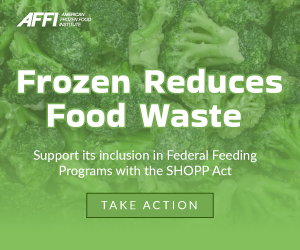The American Frozen Food Institute (AFFI) announced today the expansion of its Food Safety Zone to include a new Enteric Viruses Control Program (EVCP) aimed at preventing and controlling Norovirus and Hepatitis A throughout the global frozen fruit supply chain. Created for the international community of food safety professionals, the EVCP is a free interactive, online tool with downloadable resources for ease of incorporating into a company’s food safety plan.
“On the journey from farm to table, it takes many people to keep food safe and AFFI is committed to advancing food safety practices throughout the food chain,” said AFFI President and CEO Alison Bodor. “The launch of AFFI’s Enteric Viruses Control Program is the latest example of how AFFI is advancing food safety by developing and disseminating science-based best practices to ensure frozen foods and beverages are safe.”
The best practices that encompass the EVCP are focused on six key areas from the farm to the facility to ensure the safety of the global berry supply chain:
- Enteric Viruses
- Good Agricultural Practices (GAPs)
- Water Management
- Waste Management
- Worker Health and Hygiene
- Facility/Processing Operations
Key recommendations were developed by industry professionals and include a variety of supporting resources curated from across the food and agriculture sector. The program is intended to be a one-stop platform for a full complement of food safety information and knowledge to address risks associated with enteric viruses.
“While foodborne illness associated with frozen foods is extremely rare, action needs to be preventative when it comes to food safety,” said AFFI Senior Vice President of Scientific Affairs Dr. Sanjay Gummalla. “It’s with this preventive action in mind that the EVCP was created to cover risks associated with enteric viruses in frozen berry production on the farm and inside manufacturing facilities.”
In addition to AFFI’s EVCP, the Food Safety Zone also is home to AFFI’s Listeria Control Program.
“AFFI plans to continuously update the Food Safety Zone with additional resources and year-round education for the control and prevention of enteric viruses and Listeria,” added Bodor. “It’s this level of awareness and education that drives a food safety culture that empowers employees to make critical food safety decisions and take preventive actions to protect consumers and reduce the odds of their companies becoming a recall statistic.”
###
The American Frozen Food Institute is the member-driven national trade association representing all segments of the frozen food supply chain from manufacturers to suppliers and distributors. AFFI advocates before legislative and regulatory entities on the industry’s behalf, serves as the voice for the industry and convenes industry leadership to create an environment where frozen foods are essential in a dynamic marketplace. www.affi.org




